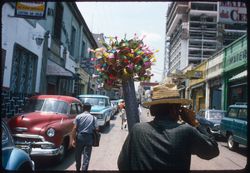The 2025-2026 Architecture as Public Concern Fellowship seeks to extend the questions that guided its first two iterations: Who is the work for? And where does the work land? Our 2025 call foregrounds how we build relations through architectural research, practice, and speculation, and it is an intentional effort to reflect on the ways we live together in this fraught and charged present moment. We ask, how can we build relation?
Relation is a critical concept and urgent area of public architectural research that moves across cultural anthropology, Indigenous studies, postcolonial studies, and other adjacent fields of inquiry, and that has yet to achieve a deep level of engagement and resolution in research related to the built environment. Architecture holds the power and responsibility to create unique modalities of relation: between groups of people, between human and nonhuman worlds, between built forms and ecologies, and between multiple localities that are connected through networks of abundance and collectivity.
Relation denotes a process of accountability and reciprocity. It asks for a relational cycle of giving, receiving, and coming together. Notions of archipelagic thinking, infinite difference, and creolization crafted by Edouard Glissant hold the potential to centre relation across land-based identities and knowledges, while also nonetheless maintaining their right to more geographically removed experiences of integrity that stand apart from dominant discourses of unimpeded, fluid movement and connection. Can we build relation otherwise?
The Architecture as Public Concern Fellowship is open only to CCA Research Network members, who may put forward relations that their research projects need help to build—more time in place-based encounters, or honoraria to acknowledge the labour of non-traditional researchers in a given process of inquiry. The fellowship should hold the ambition of relations that need to endure. The holding of these relations suggests a knowledge formation akin to but also in excess of the traditional archive—a space of endurance where relations are forged, evolve, and live on. Archives of this type can be diffuse and ephemeral, coalescing around land-based practices such as, following Robyn d’Avignon’s work in Senegal and Mali, artisanal mining and the subsurface of ritual knowledges; or can be more theoretical and follow the relations that architecture builds across sites of decolonial struggle. These are relations of survival and endurance, often holding out a future wherein some form of sovereignty ensures the perpetuation of a community.
Network members can use the fellowship funds (CAD 3,500) to advance new or existing collaborative or individual projects that centre relation and architecture’s capacity to mediate. These projects can be in any format (exhibitions, books, reports, etc.), address any period or geography, and be situated across several institutional and/or para-institutional contexts. The aim of the fellowship is to be expansive and inclusive in defining what modes of relation are needed now. Community organizations, representatives, and individuals can partner with CCA Research Network members. Recipients of the 2025–2026 Architecture as Public Concern Fellowship should have made sufficient progress on their project to share insights at the CCA Research Summer Kick Off Lecture in June, 2026.
Projects could address topics and questions such as:
• Relation and time- or land-based knowledge formations
• Relation as a movement towards opacity and self-definition
• Relation as a social and historical construct
• Relation and the politics of accountability
